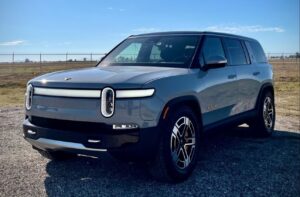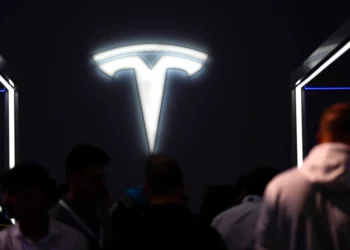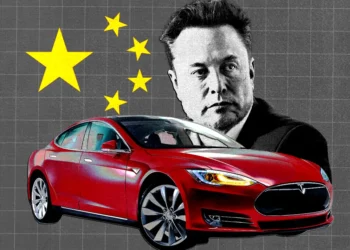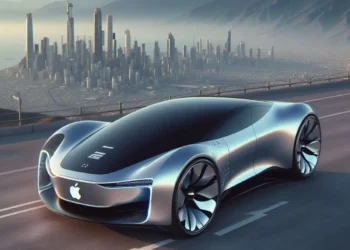
EVs are going through a rough patch in America. Profit margins at Tesla are falling, General Motors is delaying an investment in an electric-vehicle plant, and Ford Motor is slowing production of its F-150 Lightning.
Rivian Automotive (ticker: RIVN) is plowing ahead anyway. The EV start-up said Friday it plans to start construction on its second EV plant, in Georgia, right on schedule in 2024. That plant will make a second-generation product Rivian refers to as the R2 platform. It will likely encompass smaller, less expensive vehicles than the first-generation R1T pickup truck and R1S SUV, opening up more of the auto market to Rivian.
Those first-generation vehicles and the electric delivery van bought by Amazon.com (AMZN) are made at Rivian’s plant in Illinois.
Rivian stock rose in early trading but fell back for a loss of about 0.9% by mid morning. The S&P 500 and Nasdaq Composite were both off about 0.7%.
Investors have had to consider several data points that show EV sales in the U.S. aren’t going as well as the car companies hoped. Ford (F) recently said it was reducing production of its F-150 Lightning pickup truck, but that the cut was more about supply-chain constraints than EV demand or the UAW strike.
The news from General Motors (GM) was a little more concerning. Tuesday, it said it is delaying a $4 billion plan to overhaul a Michigan factory to make electric trucks to “better manage capital investment while aligning with evolving EV demand.” The overhaul will include engineering improvements that will make the trucks more profitable, the company said.
Profitability has been tougher to achieve, mainly due to repeated price cuts from Tesla (TSLA) to boost demand for its cars. Wednesday, Tesla reported third-quarter operating profit margins of less than 8%, down almost 10 percentage points year over year. CEO Elon Musk said on a call to discuss the results that higher interest rates were making Tesla cars less affordable.
To some extent, that it isn’t an EV issue. High interest rates affect the affordability of all cars. What is more, EV sales continue to hit records in the U.S. More than 313,000 all-battery electric vehicles, or BEVs, were sold in America during the third quarter, up about 50% year over year and accounting for about 8% of all new car sales.
BEV penetration of new car sales in the U.S. lags behind Europe and China, though. BEV penetration in Europe has hit 20% in recent months. It is at about 25% in China.
At Ford and GM, BEVs accounted for about 4% and 3% of U.S. sales, respectively. BMW (BMW) is doing much better, suggesting Ford and GM’s issues may result from the EVs they are offering, to some extent. BMW’s U.S. BEV sales grew 200% from a year earlier in the third quarter, accounting for more than 15% of total BMW sales.
U.S. consumers will buy an EV as long as they like it.
They seem to like Rivian’s. The company has sold more than 36,000 vehicles in the first three quarters of 2023, up almost 200% from a year earlier.

















































